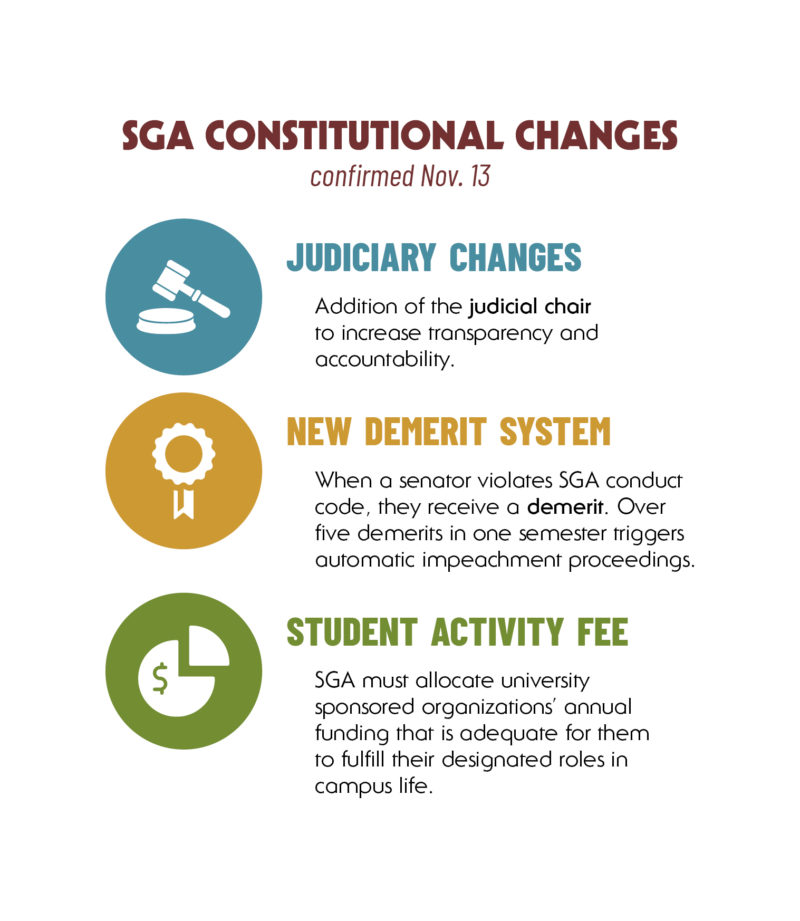Following the election of a new group of Student Government Association (SGA) senators and a new president and vice president, the Trinity student body was able to vote on SGA’s proposed constitutional amendments. On Nov. 13, SGA announced that all of the proposed constitutional amendments have been approved, most by 80 percent or more of the vote.
Over the summer, four SGA members who formed the constitutional review committee met once weekly and worked to make changes to the SGA constitution.
Nick Santulli, sitting president of SGA and senior political science major, chaired the constitutional review committee.
“We’re really excited that all the amendments are finally up for a vote,” Santulli said. “We’re really happy with the revisions we’ve attempted to make. We’re actually making substantive structural changes that haven’t been made in a while.”
Smaller changes are generally made every year, but do not usually change the way that SGA operates overall. This year, a need for underlying changes presented itself.
Along with Santulli, senators Callie Struby, junior political science and sociology double major, and Amulya Deva, junior finance and business and analytics technology major and SGA president-elect, also headed the constitutional review committee.
“Based on timeliness alone, it’s been so long since something like this was done that a lot of the things that are in [the constitution] are not going to be relevant anymore,” Struby said. “There’s things in the constitution that SGA in the past hadn’t used in 10 years, which is just unnecessary. It’s a lot more relevant for us because last semester we had a whole issue with Greek Council, and it became this kind of thing where no one really knew what the rules were.”
Some of the most important revisions to the constitution were concerned with the judicial chair, the student activity fee and the demerit system.
“We’re going to have a judiciary, so we’ll actually have a third branch of government,” Santulli said. “We’re trying to establish an independent judiciary that will be called “˜council review’ and be composed of conduct panel members plus SGA’s faculty advisors. Whenever a potential violation of the constitution is discussed and it can’t be resolved internally, that body will help hash out whether the constitution was violated and, if so, what steps should be taken next. It will be able to overturn any action that SGA takes.”
Santulli also explained the importance of updating the constitution in terms of the student activity fee.
“There’s a section on the student activity fee, and that was meant to protect USOs [university sponsored organizations],” Santulli said. “As a funding body, we fund multiple organizations all the time and the really big USOs, those are integral to the way we live our life on this campus. Defunding them or not giving them their full budget is a really huge decision, and we wanted to provide some context for that.”
Deva elaborated on some of these changes.
“We want to have an ethics side of things, so we implemented a judicial chair, and that goes along with the demerit system, which is a system to keep senators accountable,” Deva said. “There had to be some definite consequence for people who violated things like the dress code or just basic things like respecting another senator. Depending on what you do, you get a certain number of demerits. If you get a certain number of demerits within a semester, you are up for impeachment. Again, this impeachment is voted on by the senators.”
Senator Juan Luevanos, sophomore international business and finance major, was part of the constitutional committee over the summer, and assumed an advisory position during the fall. He explained why the constitutional changes that have been made are relevant to the student body.
“The constitutional changes should matter to the student body due to the fact that these changes not only impact how their representatives act on their behalf, but also how future SGAs will function,” Luevanos wrote in an email interview. “The senate had the student body in mind during the arduous task of revising the constitution and it was a product of intense negotiations. Many senators provided substantial feedback and we addressed the problems we, as well as previous SGAs, faced.”
Deva also explained why the SGA constitutional changes should matter to students.
“Not a lot of people know what SGA does, and one of the things that we do is funding for everything,” Deva said. “We represent student interests. If we are not acting in a way that would make students proud, that’s not OK. The constitution governs the way we should act and what our goals should be and who we should represent.”
The SGA constitutional revisions will go into effect in January.







